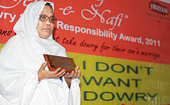 |
| A function organised by Swayam in Metiabruz to honour parents of men and women who did not accept or give dowry at their weddings |
It is all right for men to beat their wives, more than 50 per cent of women felt in a survey. About 33 per cent of the men felt the same. A man could “chastise” his wife for something “wrong” she had done, though when questioned more closely, it was found that the immediate reason behind the violence was less exalted: anger, alcoholism, extracting obedience from wife and poverty.
Swayam, a city-based organisation that works to prevent violence against women, has conducted the survey in working class communities in two localities: Metiabruz, a Muslim-dominated area in the city, and Durgapur village in Diamond Harbour, where the population is a mix of the Hindu and Muslim communities. The survey — ‘Intimate Peril, Domestic Violence against Wives in West Bengal’, was released in December. It was conducted on 461 individuals.
Violence is an everyday feature in the lives of women, something that men gave freely, something that women accept unquestioningly.
The men admitted to the violence. About 45 per cent of them said they beat their wives. Women were more hesitant in admitting to violence against them — only 35 per cent said they were beaten up. But 22 per cent said the injuries were so severe that they had required hospitalisation. About 70 per cent of the women said the perpetrators were husbands.
The survey was released at one of the events during the observation of The International Campaign to Stop Violence against Women and Girls by Swayam from November 25 to December 10.
At another event as part of the campaign held at Max Mueller Bhavan during the fortnight, a panel addressed the topic ‘Globalisation, women and violence in South Asia’.
Social scientist Kamla Bhasin pointed out that women were “the last colony”. She said both women and women were victims of capitalist patriarchy.
Rights activist Kavita Srivastava spoke passionately about the role of the state. She said it was important to keep in mind how the state was controlling resources, which was crucial to understanding violence against women.
The discussion was moderated by Samita Sen of Jadavpur University’s women’s studies department. Bhasin brought the house down when she concluded her speech saying: “The opposite of patriarchy is not matriarchy, as the opposite of malaria is not pneumonia. The opposite of malaria is good health. The opposite of patriarchy is equality.”











